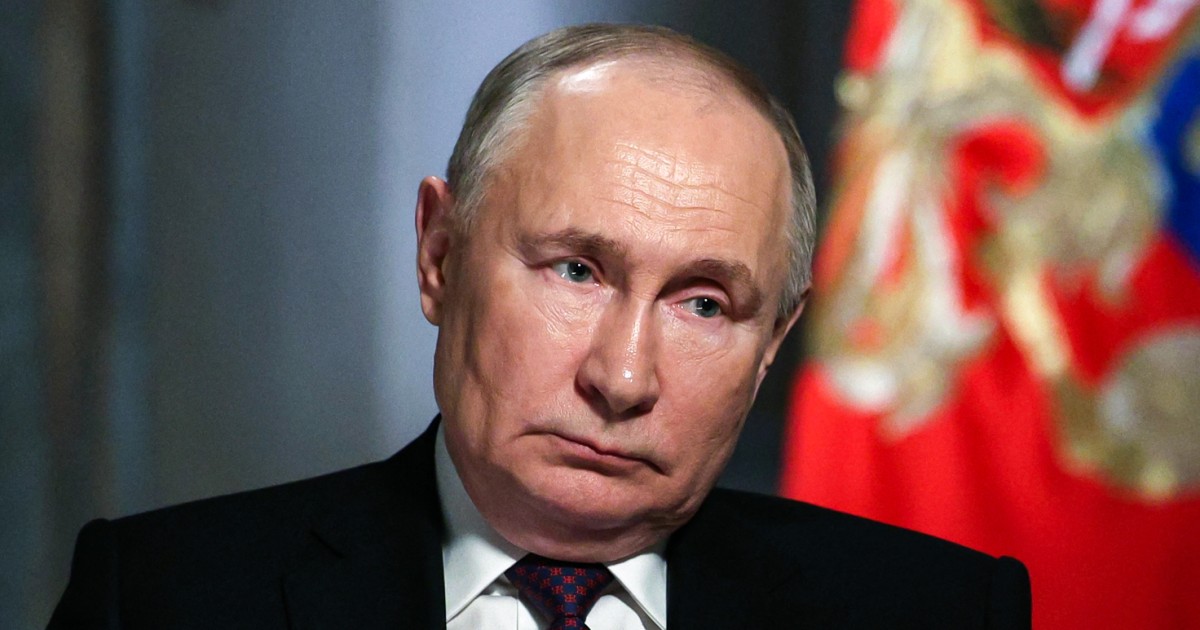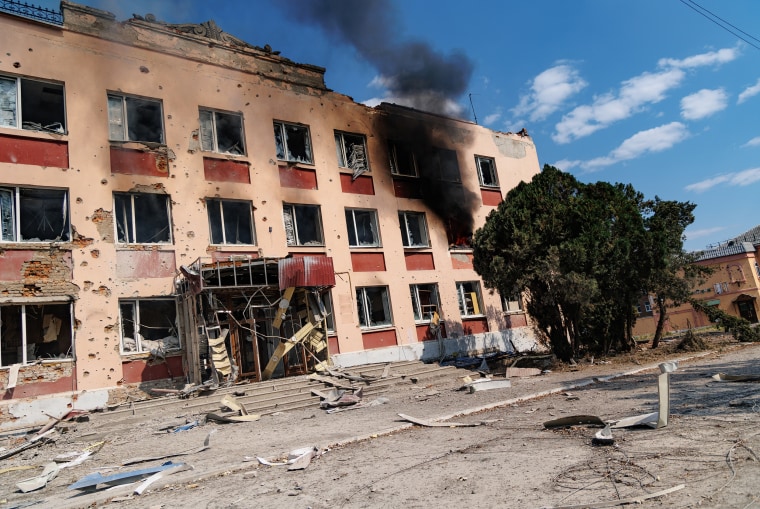Putin warns of ‘war’ with West if Ukraine gets long-range missile approval

President Vladimir Putin has warned that Russia would be “at war” with the United States and its allies if they lift restrictions on Ukraine’s use of long-range Western weapons.
Putin’s vow to follow such a move with “appropriate decisions” was his latest, perhaps most drastic attempt to draw red lines over NATO members’ backing for Kyiv, and it came on the eve of a meeting in Washington where the issue is expected to be high on the agenda.
British Prime Minister Keir Starmer held talks with President Joe Biden at the White House on Friday afternoon, as London clashed with Moscow over the expulsion of six diplomats accused of spying — accusations the U.K. dismissed as “baseless.”
Before beginning the talks, Biden said the U.S. is “committed” to standing with the U.K. to help support Ukraine against Russia.
“I’ve often said there’s no issue of global consequence where the United States and U.K. can’t work together,” Biden said. “It’s clear that Putin will not prevail in this war. The people of Ukraine will prevail.”
Asked about Putin’s comments on a potential direct war with Russia, Biden told reporters, “I don’t think much about Vladimir Putin.”
A White House readout of the meeting said that the two leaders “reaffirmed their unwavering support for Ukraine as it continues to defend against Russia’s aggression,” and that they shared “deep concern about Iran and North Korea’s provision of lethal weapons to Russia.”
The U.S. and its allies have appeared increasingly open to letting Ukraine use long-range Western missiles to strike deep inside Russia, the culmination of a monthslong push by Kyiv that has sparked the Kremlin’s fury.
“We are not talking about allowing or not allowing the Ukrainian regime to strike Russia with these weapons,” Putin said Thursday in comments to propagandist Pavel Zarubin. “We are talking about deciding whether NATO countries are directly involved in the military conflict or not.”
“This will mean that NATO countries, the U.S. and European countries are at war with Russia,” Putin said. “And if this is so, then, bearing in mind the change in the very essence of this conflict, we will make appropriate decisions based on the threats that will be created for us.”
Putin added that the Ukrainian army does not have the ability to program long-range missiles or the satellite data necessary for their targeting, relying on NATO military personnel for those tasks.
Putin’s comments were echoed by the speaker of Russia’s State Duma, Vyacheslav Volodin, in a Telegram post Friday. “NATO became a participant in military operations in Ukraine,” Volodin wrote. “They are waging war on our country.”
Kremlin spokesman Dmitry Peskov also told reporters Friday that Putin’s message was “extremely clear, unambiguous and does not allow for any double readings.”
“We have no doubt that it has reached its intended recipients,” Peskov noted.
The Kremlin and Russian propaganda have been portraying the war in Ukraine as a clash with the West and NATO since the beginning of the full-scale invasion in February 2022, and the latest threatening rhetoric from Putin appears to be an escalation of that strategy at a crucial moment.
It was unclear what Moscow’s implied response might be, though in June Putin suggested he could provide arms to other countries to hit Western targets.
Putin has repeatedly warned the West not to cross Moscow’s so-called red lines, which he warned could trigger nuclear conflict, but they have been repeatedly crossed without such a response from the Kremlin.
Ukrainian forces launched the first invasion of Russian territory since World War II last month, only to be met with a relatively muted response.
After more than a month, the Kremlin announced Thursday it had begun a major counteroffensive to retake some of the land seized in the Kursk border region, while its forces press on with an offensive in Ukraine’s east that threatens the key strategic hub city of Pokrovsk.

As things stand, Kyiv only has permission to use Western-supplied long-range weapons such as American ATACMS and British Storm Shadows to strike Russian territory along its border, and only in response to attacks from these areas.
It’s been pleading for that policy to change so it can strike military assets deeper inside Russia that are used to launch attacks on Ukrainian cities.
But Washington and its allies have been reluctant to allow that, fearing a major escalation.
That appears to have shifted in recent weeks.
Secretary of State Antony Blinken was in Kyiv on Wednesday with his British counterpart, and Biden indicated earlier this week that the U.S. was “working out” the issue.
Members of the bipartisan Congressional Ukraine Caucus signed a letter earlier this week urging Biden to lift restrictions on Kyiv’s use of long-range weapons, saying they are “inconsistent” with what America would ever accept for its own operations or restrictions that the U.S. places on its other allies, such as Israel.
Ahead of his meeting with Biden, the British leader’s office told NBC News that Starmer told reporters the U.K. does not seek any conflict with Russia. But he noted: “Russia started this conflict. Russia illegally invaded Ukraine. Russia could end this conflict straight away.”
As he arrived in Washington, Russia’s FSB internal security service announced it had revoked the accreditation of six British diplomats in Moscow whose actions it said had signs of “reconnaissance and subversive work.”
Britain dismissed the accusations as “completely baseless.”
Related
Newspaper headlines: ‘Putin’s dirty work in UK’ and ‘Honeytrap spies’
The Times focuses, external on Donald Trump's latest comments about the war in Ukraine. Its headline quotes the US president, who said Vladimir Putin was "doing
‘This could end in World War Three,’ warns Trump as…
7 March 2025, 17:31 | Updated: 7 March 2025, 18:06 'This could end in Worl
Met Office ‘polar vortex’ update as temperatures to plummet
The weather is expected to quickly change after a spell of sunshineThe Met Office has warned that "colder weather is on the way."(Image: Liverpool ECHO)It is fo
British Pie Awards 2025: Naan better as kebab pie wins…
The Turkish-tinged creation by Boghall Butchers - which is celebrating its 50th year in business - won through in the newly-formed fusion category, which also f













